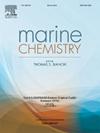根据底物C:N:P化学计量学,在实验升高的温度下,富碳海洋有机物的微生物消耗增强
IF 2.5
3区 地球科学
Q2 CHEMISTRY, MULTIDISCIPLINARY
引用次数: 0
摘要
海洋微生物对海洋生态系统至关重要,并通过其在地球生物地球化学循环中的重要作用影响全球气候。鉴于海洋在生态系统中的复杂作用,了解海洋温度升高对有机物循环的影响是很重要的,据推测,有机物循环通过加速微生物对有机物对二氧化碳的呼吸作用,对未来的变暖做出了积极的反馈。我们通过实验研究了在2019年和2020年秋季浮游植物繁殖期间,微生物对缅因湾快速变暖的海洋颗粒OM (POM)消耗的温度敏感性。在两周的瓶孵育过程中,对原位和高温下微生物POM (C、N和P池)消耗的总体速率和数量进行了量化。与较冷的温度(12至14°C)相比,在较热的温度(+5至6°C)下孵育的POM通常以更快的速度消耗,总体消耗量更大。发现元素池的消耗率和温度敏感性(Q10参数)具有显著的年际变化,并与初始POM C:N:P化学计量有关。更多的富氮POM在原位温度下优先被消耗,而富含碳的POM(可能含有陆源成分)在较高的实验温度下优先被消耗。经验估计的温度敏感性(Q10)在2019年为2.7 - 3.4,而在2020年为1.0-1.2,POM元素池之间和之间的变化表明温度和有机物底物化学计量(组成)在决定微生物POM对海洋温度变暖的再矿化反应中起重要作用。本文章由计算机程序翻译,如有差异,请以英文原文为准。
Enhanced microbial consumption of carbon-rich marine organic matter at experimentally elevated temperatures dictated by substrate C:N:P stoichiometry
Marine microbes are vital to oceanic ecosystems and influence the global climate through their paramount role in Earth's biogeochemical cycles. With this intricate role in ecosystems, it is important to understand the effect of increasing ocean temperatures on the cycling of organic matter (OM), which is hypothesized to contribute a positive feedback to future warming via an acceleration in microbial respiration of OM to CO2. We experimentally investigated the temperature sensitivity of microbial consumption of marine particulate OM (POM) focused in the rapidly warming Gulf of Maine during the 2019 and 2020 fall phytoplankton bloom. The overall rate and quantity of microbial POM (C, N, and P pools) consumption at in situ versus elevated temperatures were quantified within bottle incubations over the course of two weeks. POM incubated at warmer temperatures (+5 to 6 °C) was generally consumed at a faster rate with an overall larger quantity consumed compared to cooler temperatures (12 to 14 °C). Significant interannual variability in consumption rates and temperature sensitivity (Q10 parameter) across elemental pools was found and linked to the initial POM C:N:P stoichiometry. More nitrogen-rich POM was preferentially consumed at in situ temperatures, whereas carbon-rich POM, likely containing a terrigenous component, was preferentially consumed at warmer experimental temperatures. The empirically estimated temperature sensitivity (Q10) ranged from 2.7 to 3.4 in 2019 versus 1.0–1.2 in 2020, variable between and amongst POM elemental pools, suggesting both temperature and organic matter substrate stoichiometry (composition) play an important role in dictating the microbial POM remineralization response to warming ocean temperatures.
求助全文
通过发布文献求助,成功后即可免费获取论文全文。
去求助
来源期刊

Marine Chemistry
化学-海洋学
CiteScore
6.00
自引率
3.30%
发文量
70
审稿时长
4.5 months
期刊介绍:
Marine Chemistry is an international medium for the publication of original studies and occasional reviews in the field of chemistry in the marine environment, with emphasis on the dynamic approach. The journal endeavours to cover all aspects, from chemical processes to theoretical and experimental work, and, by providing a central channel of communication, to speed the flow of information in this relatively new and rapidly expanding discipline.
 求助内容:
求助内容: 应助结果提醒方式:
应助结果提醒方式:


